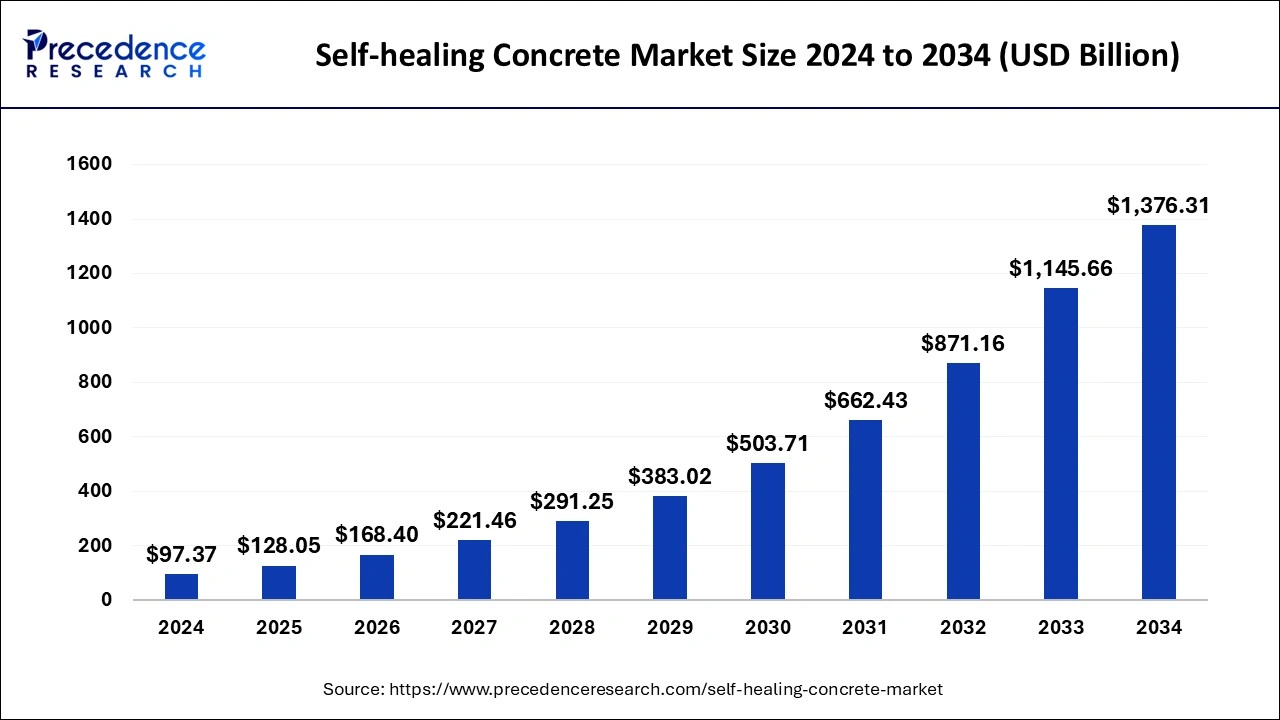The global self-healing concrete market size accounted for USD 74.04 billion in 2023 and is predicted to grow around USD 1,145.66 billion by 2033, growing at a CAGR of 31.51% from 2024 to 2033.
Key Points
- Europe dominated the market with the largest market share of 40% in 2023.
- North America is expected to grow significantly in the global market.
- By form, the vascular segment accounted for the highest revenue share of 40% in 2023.
- By form, the capsule based segment is expected to grow at a significant rate during the forecast period.
- By application, the infrastructure application segment dominated the market in 2023.
- By application, the industrial segment is projected to expand rapidly in the upcoming years.

The self-healing concrete market is witnessing significant growth driven by the increasing demand for sustainable and durable construction materials. Self-healing concrete, also known as bio-concrete or autonomous repair concrete, is designed to repair cracks autonomously without human intervention. This innovative material has gained attention due to its potential to extend the lifespan of structures and reduce maintenance costs over time. The market for self-healing concrete is expected to expand as construction practices worldwide emphasize durability and environmental consciousness.
Get a Sample: https://www.precedenceresearch.com/sample/4285
Growth Factors
Several key factors are driving the growth of the self-healing concrete market. One of the primary drivers is the rising investments in infrastructure development across various regions. Governments and private entities are increasingly focused on constructing long-lasting and resilient buildings and transportation structures, which has boosted the adoption of innovative construction materials like self-healing concrete. Additionally, growing awareness about sustainable construction practices and the need for reducing carbon footprints in the construction industry have propelled the demand for eco-friendly materials such as self-healing concrete.
Region Insights
The adoption of self-healing concrete varies across regions based on factors such as infrastructure development trends, construction regulations, and technological advancements. Developed regions like North America and Europe are at the forefront of adopting advanced construction technologies, including self-healing concrete, driven by stringent building codes and sustainability goals. In emerging economies of Asia Pacific and Latin America, rapid urbanization and increasing investments in infrastructure are creating substantial opportunities for market growth, with governments promoting the use of innovative materials to enhance the longevity of public infrastructure.
Self-healing Concrete Market Scope
| Report Coverage | Details |
| Growth Rate from 2024 to 2033 | CAGR of 31.51% |
| Self-healing Concrete Market Size in 2023 | USD 74.04 Billion |
| Self-healing Concrete Market Size in 2024 | USD 97.37 Billion |
| Self-healing Concrete Market Size by 2033 | USD 1,145.66 Billion |
| Largest Market | Europe |
| Base Year | 2023 |
| Forecast Period | 2024 to 2033 |
| Segments Covered | By Form and By Application |
| Regions Covered | North America, Europe, Asia-Pacific, Latin America, and Middle East & Africa |
Self-healing Concrete Market Dynamics
Drivers
Several drivers are fueling the demand for self-healing concrete in the construction industry. One key driver is the need to reduce maintenance costs associated with infrastructure. Self-healing concrete can mitigate the need for frequent repairs and maintenance, thereby saving time and money for infrastructure owners and operators. Additionally, the enhanced durability and extended lifespan offered by self-healing concrete appeal to developers and contractors seeking long-term solutions for construction projects.
Opportunities
The self-healing concrete market presents promising opportunities for manufacturers and suppliers globally. As research and development efforts continue to improve the efficiency and cost-effectiveness of self-healing concrete technologies, new applications and markets are likely to emerge. For instance, the adoption of self-healing concrete in marine environments or corrosive industrial settings could unlock significant growth opportunities for the market players.
Challenges
Despite the promising potential, the self-healing concrete market faces certain challenges. One major challenge is the initial cost of adopting self-healing concrete compared to traditional concrete. Convincing stakeholders about the long-term benefits and return on investment of self-healing concrete remains crucial. Moreover, scaling up production and ensuring consistent quality standards pose logistical challenges for manufacturers aiming to meet the growing demand for self-healing concrete in various construction projects.
Read Also: Construction Glass Market Size to Worth USD 187.25 Bn by 2033
Self-healing Concrete Market Recent Development
- In December 2023, Drexel University’s College of Engineering came up with research to give concrete the properties of tissue healing, where the concrete healing bacteria will rush to the site of cracks and repair the damage. A strain of the bacteria Lysini-bacillus sphaericus will be the healing agent. The bacteria is found in soil and is able to drive a process of microbial-induced calcium carbonate precipitation. From this process, it creates a stone-like material that can harden and stabilize, thereby sealing the exposed cracks.
Self-healing Concrete Market Companies
- Basilisk
- PENETRON
- Kryton
- Xypex Chemical Corporation
- Sika AG
- BASF SE
- Hycrete, Inc.
- Cemex
- Oscrete
- GCP Applied Technologies
- RPM International
Segments Covered in the Report
By Form
- Intrinsic
- Capsule Based
- Vascular
By Application
- Residential
- Industrial
- Commercial
- Infrastructure
By Geography
- North America
- Asia Pacific
- Europe
- Latin America
- Middle East & Africa
Contact Us:
Mr. Alex
Sales Manager
Call: +1 9197 992 333
Email: sales@precedenceresearch.com
Web: https://www.precedenceresearch.com
Blog: https://www.expresswebwire.com/
Blog: https://www.uswebwire.com/
Blog: https://www.dailytechbulletin.com/
Blog: https://www.autoindustrybulletin.com/
